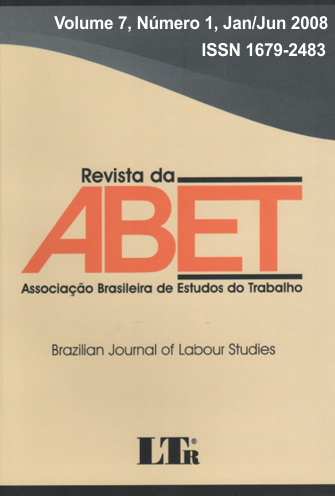WORKER’S LABOR AND HEALTH IN RURAL SETTLEMENTS
Abstract
Can cooperate and self manageable work contribute to solve problems related to unemployment, misery and social rootlessness which affect workers’ health and bio-psychosocial integrity? By studying rural settlements organized according to the self managed cooperation principles, I try to understand the changes which took place in rural workers’ work and life conditions. Not only does life conditionrefers to the possibility of acceding to individual and/or collective consumption goods, but, above all, to the control degree workers might have on social and political relations dealing with work organization, to the decision making power and self management. Difficulties exist related to both the lack of adequate conditions (credit, technology and technical support), to organize production and trade, to the lack of infra-structure (housing, electricity, water, roads, education and health) to make societary life viable, and to the difficulty to overcome the salary-based culture characterized by submission, dependence and work load naturalization as well as health worsening. However, despite the lack of resources and the insufficiency of public policies, workers felt to be less vulnerable because they viewed the possibility to learn new ways of health promotion through associativism and agro-ecology, which allow them to rescue traditional health care practices and environmental protection when organizing work and daily life.
Downloads
Downloads
Published
How to Cite
Issue
Section
License
Política de Acesso Livre
Esta revista oferece acesso livre imediato ao seu conteúdo, seguindo o princípio de que disponibilizar gratuitamente o conhecimento científico ao público proporciona maior democratização mundial do conhecimento.
Atribuição dos artigos é não comercial (sem derivações 4.0, isto é, Creative Commons) e o acesso é livre e gratuito para download e leitura.
Não há taxa para submissão, avaliação e publicação de artigos.
Copyright
1) Os artigos são de responsabilidade exclusiva dos autores. É permitida sua reprodução, total ou parcial desde que seja citada a fonte.
2) Os trabalhos enviados para publicação devem ser inéditos, não sendo permitida sua apresentação simultânea em outro periódico nacional.
3) Os artigos são submetidos a pareceristas "ad hoc", após prévia avaliação da Comissão Editorial, os quais podem aceitar, recusar ou reapresentar o original ao autor com sugestões para alterações. Os nomes dos pareceristas permanecem em sigilo, bem como os nomes dos autores.
Os Autores que publicam nesta revista concordam com os seguintes termos:
Autores mantêm os direitos autorais e concedem à revista o direito de primeira publicação, com o trabalho simultaneamente licenciado sob a Creative Commons Attribution License, permitindo o compartilhamento do trabalho com reconhecimento da autoria do trabalho e publicação inicial nesta revista.
Autores têm autorização para assumir contratos adicionais separadamente, para distribuição não-exclusiva da versão do trabalho publicada nesta revista (ex.: publicar em repositório institucional ou como capítulo de livro), com reconhecimento de autoria e publicação inicial nesta revista.
Autores têm permissão e são estimulados a publicar e distribuir seu trabalho online (ex.: em repositórios institucionais ou na sua página pessoal), já que isso pode gerar alterações produtivas, bem como aumentar o impacto e a citação do trabalho publicado.
Patrocinador
A publicação recebe financiamento da Associação Brasileira de Estudos do Trabalho.










